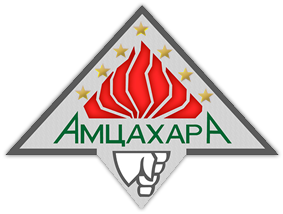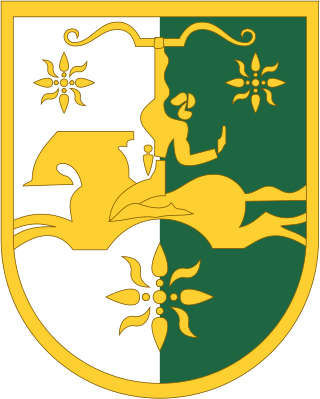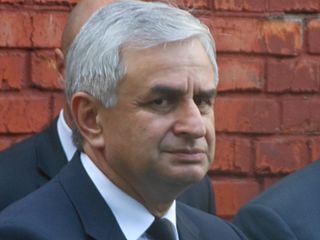
Raul Jumkovich Khajimba is an Abkhazian politician, and served as President of Abkhazia from 25 September 2014 until 12 January 2020. He was also Chairman of the Forum for the National Unity of Abkhazia from 2010 to 2015. Khajimba previously held the offices of Vice President (2005–2009), Prime Minister (2003–2004) and Defence Minister (2002–2003). He unsuccessfully ran for President in 2004, 2009 and 2011. He resigned the presidency in 2020 due to protests against him.

Amtsakhara is the main opposition party in Abkhazia.

The prime minister of Abkhazia is the de facto head of government of the partially recognized Republic of Abkhazia, that is de jure part of Georgia.

The office of Minister for Foreign Affairs of the Republic of Abkhazia was created on 17 May 1993, during the 1992–1993 war with Georgia. Due to the diplomatic isolation of Abkhazia, which remains widely unrecognised, the role of the foreign minister has been restricted mostly to negotiations over resolving the Georgian-Abkhazian conflict. Empirical data nevertheless show that Abkhazia's Foreign Ministry also enacts diplomatic relations, such as the sending of diplomatic notes, with various countries across the world, including Nauru, Vanuatu, Venezuela, Nicaragua, and Syria. It is also active in managing relations with other post-Soviet de facto states such as South Ossetia, Transnistria, and the Lugansk People's Republic.
Sergei Shamba is a senior politician from Abkhazia. He is currently a member of the People's Assembly of Abkhazia and Chairman of United Abkhazia. He was Prime Minister of Abkhazia under President Sergei Bagapsh from 13 February 2010 until 27 September 2011. Between 1997 and 2010 he had been Minister for Foreign Affairs under both Bagapsh and his predecessor Vladislav Ardzinba, with only a half-year interruption in 2004. Shamba has twice unsuccessfully participated in presidential elections, in 2004 and 2011. He has been a staunch proponent for dialogue between Abkhazia and Georgia.

Presidential elections were held in Abkhazia on 12 January 2005. The result was a victory for Sergei Bagapsh of United Abkhazia, who received over 90% of the vote.

Presidential elections were held in Abkhazia on 3 October 2004, the first that were competitive. Election law prohibited incumbent President Vladislav Ardzinba from running for a third term and he instead backed Prime Minister Raul Khadjimba, who also enjoyed support from the Russian authorities. Khadjimba's main opponent was Sergei Bagapsh, who was supported by the two major opposition parties, United Abkhazia and Amtsakhara, and later also by Aitaira when their candidate Alexander Ankvab was barred from running in a controversial decision by the Central Election Commission.
The Forum for the National Unity of Abkhazia is a prominent oppositional political party in Abkhazia. It is led by former President Raul Khajimba.
The 5th convocation of the People's Assembly of Abkhazia took office following the 2012 elections on 3 April 2012 and was replaced by the 6th convocation following the 2017 elections.
Leonid Yurivich Dzapshba is a two-time Minister for Internal Affairs of Abkhazia, a former Presidential candidate and the former head of the Football Federation of Abkhazia.
Otar Mikhailovich Khetsia has twice been Minister of Internal Affairs of Abkhazia.
The Abkhazian Revolution took place in 2014, when President Aleksandr Ankvab resigned after hundreds of demonstrators stormed his office. After mass protests in the capital Sukhumi and the occupation of his office on 27 May, Ankvab fled to his hometown of Gudauta and ultimately resigned on 1 June, after previously denouncing the demonstration as an attempted coup d'état.
The Minister for Internal Affairs holds a ministerial position in the government of the Republic of Abkhazia. The post existed in the Soviet period within the Council of Ministers of the Abkhaz Autonomous Soviet Socialist Republic, and since then has been occupied by 10 politicians, of whom three have occupied it twice. The current Minister is Aslan Kobakhia.

Presidential elections were held in the Republic of Abkhazia on 24 August 2014. The sixth such elections since the post of President of Abkhazia was created in 1994, they were held early due to the resignation of President Alexander Ankvab on 1 June 2014 following the 2014 Abkhazian political crisis. Four candidates contested the elections, which were won by Raul Khadjimba, who received just over 50% of the vote.

The Government of President Raul Khajimba was the Government of the Republic of Abkhazia from 2014 until 2020.
Shamil Adzynba is the current First Vice Premier of Abkhazia in the Government of President Khajimba, and a two-time acting Prime Minister.
Artur Mikvabia is an economist and politician from Abkhazia. He was Prime Minister in the Government of President Khajimba between 20 March 2015 and 26 July 2016.
Beslan Badrovich Khagba is a former Minister for Internal Affairs of Abkhazia. He was born 23 May 1956 in Gudauta
Raul Lolua is a former Minister for Internal Affairs of Abkhazia.

Aslan Georgievich Bzhania has been President of Abkhazia since 23 April 2020. He was the Head of the State Security Service from 2010 to 2014, and one of the leaders of the opposition in Abkhazia from 2016. He ran in the 2019 presidential election, but was forced to withdraw due to poisoning. He won the subsequent 2020 presidential election.







